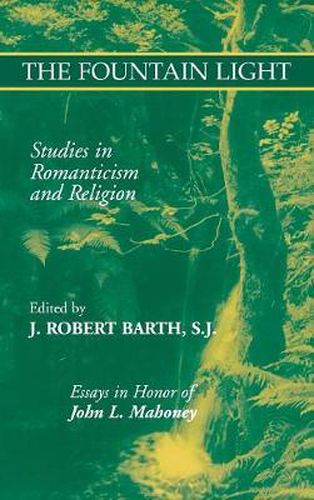Readings Newsletter
Become a Readings Member to make your shopping experience even easier.
Sign in or sign up for free!
You’re not far away from qualifying for FREE standard shipping within Australia
You’ve qualified for FREE standard shipping within Australia
The cart is loading…






It has often been suggested that Romanticism of its very nature has affinities with religious quest and spiritual values. These new essays, written in honor of distinguished eighteenth-century and Romantic scholar John L. Mahoney, explore the intersection of Romanticism and religion. They range from broad considerations of this relationship in several Romantic writers to close readings of individual poems. David Perkin’s opening essay on religion and animal rights, which considers a wide range of Romantic literature, is followed by six essays on various aspects of religious experience in Wordsworth: Robert Kiely on Wordsworth and St. Francis of Assisi; Dennis Taylor discussing the reemergence of the imagery of medieval Catholicism in his work; David Leigh tracing some of Wordsworth’s religious rhetoric and imagery to William Cowper; Charles Rzepka on religious dimensions of the early Prelude; John Anderson comparing the religious sonnets of Wordsworth and Felicia Hemans; and J. Robert Barth considering the influence of Wordsworth on Gerard Manley Hopkins. The next sequence of studies focuses on Coleridge: James Engell on Coleridge’s discussions of the soul; Thomas Lloyd on the religious use of mythos in Coleridge; Jonathan Mulrooney discussing the influence of Burwick on Coleridge and De Quincey on the subject of miracles; and Philip Rule tracing the affinities between Coleridge and Newman in their emphasis on the role of conscience in human experience. The collection closes with Judith Wilt’s exploration of the exotic theology of Maturin in Melmoth the Wanderer. This collection, which breaks new ground in the exploration of the role of religion in the Romantic experience, will be of interest not only to scholars of Romanticism and historians of nineteenth-century religion, but to anyone interested in the intellectual life of the nineteenth-century England.
$9.00 standard shipping within Australia
FREE standard shipping within Australia for orders over $100.00
Express & International shipping calculated at checkout
It has often been suggested that Romanticism of its very nature has affinities with religious quest and spiritual values. These new essays, written in honor of distinguished eighteenth-century and Romantic scholar John L. Mahoney, explore the intersection of Romanticism and religion. They range from broad considerations of this relationship in several Romantic writers to close readings of individual poems. David Perkin’s opening essay on religion and animal rights, which considers a wide range of Romantic literature, is followed by six essays on various aspects of religious experience in Wordsworth: Robert Kiely on Wordsworth and St. Francis of Assisi; Dennis Taylor discussing the reemergence of the imagery of medieval Catholicism in his work; David Leigh tracing some of Wordsworth’s religious rhetoric and imagery to William Cowper; Charles Rzepka on religious dimensions of the early Prelude; John Anderson comparing the religious sonnets of Wordsworth and Felicia Hemans; and J. Robert Barth considering the influence of Wordsworth on Gerard Manley Hopkins. The next sequence of studies focuses on Coleridge: James Engell on Coleridge’s discussions of the soul; Thomas Lloyd on the religious use of mythos in Coleridge; Jonathan Mulrooney discussing the influence of Burwick on Coleridge and De Quincey on the subject of miracles; and Philip Rule tracing the affinities between Coleridge and Newman in their emphasis on the role of conscience in human experience. The collection closes with Judith Wilt’s exploration of the exotic theology of Maturin in Melmoth the Wanderer. This collection, which breaks new ground in the exploration of the role of religion in the Romantic experience, will be of interest not only to scholars of Romanticism and historians of nineteenth-century religion, but to anyone interested in the intellectual life of the nineteenth-century England.